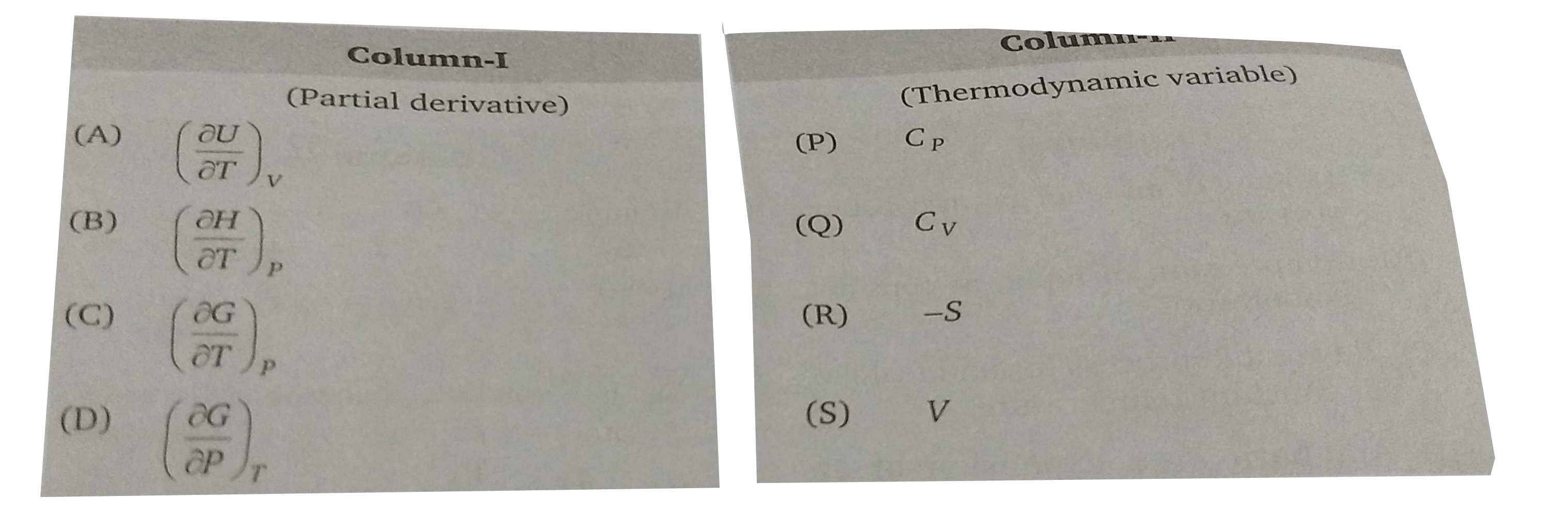The heat of formation of is . The (in ) of the reaction, is Solution in Punjabi
46
92
The correct Answer is:C
Topper's Solved these Questions
- THERMODYNAMICSBOOK - NARENDRA AWASTHICHAPTER - THERMODYNAMICSEXERCISE - Level 3 - One Or More Answers Are Correct
1 Videos
- THERMODYNAMICSBOOK - NARENDRA AWASTHICHAPTER - THERMODYNAMICSEXERCISE - Level 3 - Match The Column
2 Videos
- THERMODYNAMICSBOOK - NARENDRA AWASTHICHAPTER - THERMODYNAMICSEXERCISE - Level 2 (Q.1 To Q.30)
1 Videos
- STOICHIOMETRYBOOK - NARENDRA AWASTHICHAPTER - STOICHIOMETRYEXERCISE - Level 3 - Subjective Problems
20 Videos
Similar Questions
Assume ideal gas behaviour for all the gases considered and neglect vibrational degrees of freedom. Separate equimolar sample. Separate equimolar samples of Ne, O2 , CO2 and SO2 were subjected to a two process as mentioned. Initially all are at same state of temperature and pressue.
Step I → All undergo reversible adiabatic expansion to attain same final volume, which is double the original volume thereby causing the decreases in their temperature.
Step → After step I all are given appropriate amount of heat isochorically to restore the original temperature.
Mark the correct option(s) :
View SolutionMatch the following columns

View SolutionWrite structure of 2,2-dimethylheptane.
View SolutionWhat volume of a liquid (in L) will contain 10 mole ? If molar mass of liquid is 280 and its density is 1.4 g/mL.
View SolutionThe stande enthalpy of formation for NH_(3)(g) is -46.1KJxxmol^(-1) .Calculate DeltaH^(@) for the reaction : 2NH_(3)(g)toN_(2)(g)+3H_(2)(g)
View SolutionFor the reaction
3N2O(g)+2NH3(g)→4N2(g)+3H2O(g)ΔH∘=−879.6KJ if standard heat of formation of ammonia and water are -45.9KJ/mol and -241.8KJ/mol. Then standard heat of formation of nitrous oxide in KJ/mol is
View SolutionThe heat of formation of NH_(3)(g) is -46 " kJ mol"^(-1) . The DeltaH (in " kJ mol"^(-1) ) of the reaction, 2NH_(3)(g)rarrN_(2)(g)+3H_(2)(g) is
View SolutionThe heat of formation of NH3(g) is −46 kJ mol−1. The ΔH (in kJ mol−1) of the reaction, 2NH3(g)→N2(g)+3H2(g) is
View SolutionThe enthalpy of formation of ammonia is -46.0 KJ mol^(-1) . The enthalpy change for the reaction 2NH_(3)(g)rarr N_(2)(g)+3H_(2)(g) is :
View SolutionThe enthalpy of formation of ammonia is -46.0 kJ mol^(-1) . The enthalpy change for the reaction 2NH_(3)(g)rarr2N_(2)(g)+3H_(2)(g) is
View SolutionFor the reaction N2(g)+3H2(g)→2NH3(g),ΔH=−93.6KJmol−1 the formation of NH3 is expected to increase at :
View SolutionThe enthalpy of formation of NH3 is −46kJ/mol The enthalpy change for reaction :
2NH3(g)→N2(g)+3H2(g) is :
View SolutionEnthalpy of formation of ammonia is −46.0kJmol−1.The enthalpy change for the reaction:
2NH3(g)→N2(g)+3H2(g)
View SolutionIf ΔfG∘ for NH3(g) is −16.4kJmol−1, thenΔG∘ for the reaction: N2(g)+3H2(g)→2NH3(g) is
View SolutionThe enthalpy of formation of NH_(3) is -46 kJ//mol The enthalpy change for reaction : 2NH_(3)(g) rarr N_(2)(g) + 3H_(2)(g) is :
View Solutionअभिक्रिया N2(g)+3H2(g)⇔2NH3(g),ΔH−93.6kJ, के अनुसार अधिकतम NH3 उत्पादन किया जा सकता है
View Solution
